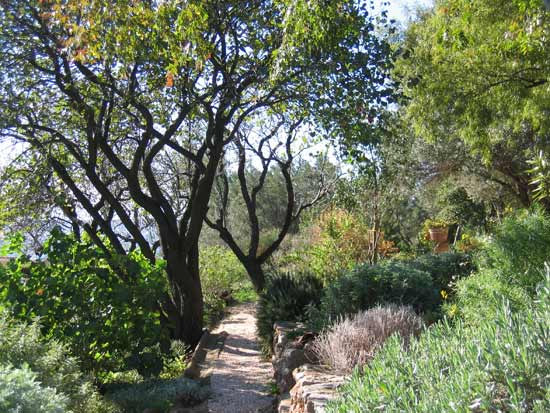- Discoveries (3)
- Events (3)
- Mediterranean notes (3)
- Perspectives on country living (1)

MEDITERRANEAN LANDSCAPE ART
Sparoza, a founding Mediterranean garden
There is a debate currently among members of the Mediterranean Garden Society about Sparoza, an innovative garden near Athens, dating from the 1960s, where the society was born and which it still contributes to maintaining. Its custodian, Sally Razelou, was the MGS’s first president. For various reasons including Sally’s inevitable aging, the future of this garden is in doubt. I was asked to explain why I think this historic garden is really important for an association like the MGS, with its worldwide membership and growing international interest. Here is what I wrote:

Sparoza, near Athens (Louisa Jones)
I was once told in our French country village that there are two conditions you cannot acquire, that you have to be born into: the aristocracy and the peasantry. Sparoza for me is like that. It is a birthplace, a heritage, that could never be acquired but which the MGS was born into. We are all besieged daily by international associations that come and go, and are all much the same. Sparoza gives the MGS real roots in every sense. Once lost, this condition could never be regained. This is a bit like Wisley for the Royal Horticultural Society. How many RHS members have actually set foot in it? But all know that the society’s first and main garden still keeps nourishing the whole structure at every level—the website, the seed bank, the journal…
We hear so much about local versus global identity, and the importance of protecting indigenous character. I would hate to see the MGS deteriorate into a conflict between locals and globals. Sparoza illustrates the best kind of cosmopolitanism—British, American, Greek--and at the same time, a mix of various ways of seeing the world—through architecture, urban design, garden design, horticulture, and botany— all of which contribute to a very strong, local spirit of place. We have been very lucky that its devoted guardians understand and cultivate this spirit.
It means a lot to me also that the MGS should be rooted in Attica. You know that cliché about the Greeks not having gardens because all of Greece is a garden? I have come to understand the deeper sense of this more and more in recent years. In the old Homeric hymns, human beings growing plants, for beauty or practical uses, are all part of nature’s own dynamics. Wild areas, field and garden are all one. Today’s humanist ecologists are striving to recover this sense of people as part of the biosphere rather than its rulers or destroyers. For gardeners, this means living in accordance with the logic of place—which can also save a lot of waste and energy. This is an ancient Greek model, and Sparoza has always been managed this way.
But Sparoza is more than a symbol, it is a very real example, a testing ground, a plant collection, a seed bank, a preserved but ever-growing landscape. The problem now is how to keep it growing, literally and figuratively. And it seems that more global recognition might help. Wisley of course has a lot of funding and is readily accessible. The DVD in preparation should be a godsend in this respect, but there are many other possibilities to explore in the near future. I hope to see the MGS move in that direction.
See Sparoza on www.MediterraneanGardenSociety.org. See also www.mgsforum.org/smf/index.php
Comments
Post new comment